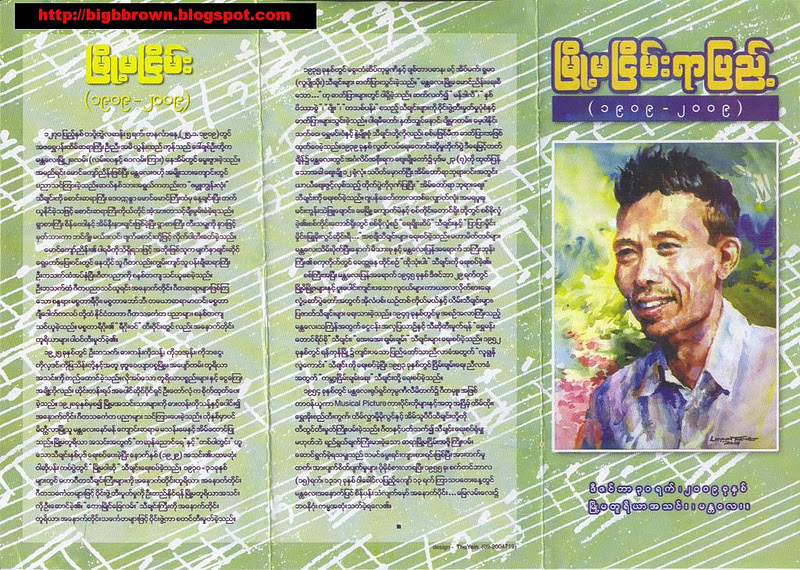BURMA (MYANMAR)
The Border Crossing Vision of Myo-ma Nyein
Burma’s classical music icon championed his country’s traditional music and the Western classics both. Constantly at odds with the authorities, he died with his dream of a national orchestra unrealized.
Myo-ma Nyein: '...his works and ideas are still as influential to Burmese music as the sun and moon'By Arkar Moe
Myo-ma Nyein died in September, 1955, his dream of a national orchestra combining performances of traditional Burmese and Western classical music still unfulfilled. He was regarded as the first Burmese musician to learn Western musical notation and orchestral arrangement. Many regard him as one of the greatest musicians in Burmese music history.
Says writer Nyi Pu Lay: “Sayar Myo-ma Nyein was the only one of his era. I believe his songs and art will live forever. So many people, including youngsters, still appreciate his music, and that shows his creativity was modern and brilliant. He was a well-versed musician. Burmese artists should take a lesson from him because he encouraged us to learn both Burmese and Western classics."
Tin Win, a 60-year-old violinist who played in the Myo-ma orchestra, says, “I regarded Sayar Nyein as a talented musician. Our Myo-ma orchestra must try its best--despite the current music trends--to maintain traditional Burmese music.”
“He was a pioneer,” wrote Ludu Daw Amar in her book Pyi-thu-chit-thaw Anu-pyin-nya-shin-myar (Artists Whom the People Loved). “Myo-ma Nyein spent his whole life working for the formation of a symphony orchestra. Before him, no songwriter created musical arrangement.”
A 100th anniversary poster celebrating the life and music of pioneering Burmese classical musician/composer Myo-ma NyeinWell-known Burmese author Sue Nget paid tribute to the Mandalay-born songwriter in pointing out that Nyein's "great aim was to form a symphony orchestra. But his dream of a national orchestra has still not been realized in Burma. He and his best friend, Dartan U Thant, believed that Burma needed to learn Western musical notation and that traditional Burmese songs needed to be composed with a Western arrangement."
“He envied and praised Beethoven’s music about nature, and he tried to combine classical Burmese verses and poems with sophisticated international compositions that ordinary people would appreciate,” says Sue Nget. “Actually, his works and ideas are still as influential to Burmese music as the sun and moon."
‘Thet Wai,’ a popular Myanmar song written by Myo-ma Nyein in 1941. The vocalists are Pyi Hla Pe and May Shin.Born in 1909, Myo-ma Nyein developed musical skills early on in life. He took up the banjo in the years when the world was bopping to the new rhythms emanating from the United States, and when he was only 19 he founded Burma’s most popular band, Myo-ma, a moniker which he later adopted as his own name.
While open to Western music and the classics, Myo-ma Nyein also remained true to Burmese tradition--the “Mahagita,” or “Great Music,” a collection of verses and songs passed orally from one generation to the other over the past three centuries.
His struggle to create a truly representative, internationally respected body of musicians led him into a series of political as well as cultural entanglements with successive Burmese regimes. Nyein’s eclectic tastes in music, particularly his love of Western classics, also got him into trouble with conservative elements that resisted non-Burmese cultural influences, including several popular traditional musicians who stonewalled his newfangled musical ideas.
‘Thitsar,’ written by Myo-ma Nyein, performed by Khin Maung ToeHis difficulties mounted in 1953 when Burma’s post-independence government, the Anti-Fascist People’s Freedom League (AFPFL) accused him of pro-communist sentiments after he wrote a song for a World Peace Conference gathering in Beijing. “From now on, I’ll only write songs about love,” he quipped.
Myo-ma Nyein was not only a champion of free musical expression but also a rigorous defender of his own artistic freedom. He refused an offer by the AFPFL of a teaching post at the state-run art college because he feared having to compromise his principles. His refusal led to increased AFPFL surveillance, and suspicion of communist tendencies hung so heavily over him that when a Chinese cultural exchange group presented him with a collection of Chinese stamps in recognition of a classical Burmese song, he hid the gift and it was only uncovered after his death.
Myo-ma Nyein's influence did not stop with music; he was also involved in Burmese cinema. He served as a composer for the Mandalay Film company in the 1950s and created many enduring anthems for future generations.
He composed a song to the verse of the poem “Silver Seagull” by late national poet Min Thu Wun, which was immensely popular throughout Burma. He also composed traditional songs about Mandalay, especially the traditional "Thingyan Water Festival," many of which live to this day as common classics in Burmese society.
The Mandalay Myo-ma Amateur Music Association was established by Myo-ma Nyein and his friends in 1925. In 1928, they drew and published a list of goals and rules for their association, including the study and promotion of Burmese classical songs and Western ararngement, the formation of a modern symphony orchestra and the encouragement of other orchestras in Burma.
May Shin’s original version of Myo-ma Nyein’s ‘Pyo Mhar Tan’
A recent solo piano version of Myo-ma Nyein’s ‘Pyo Mhar Tan’One of Myo-ma Nyein's sons, U Shunn Myaing, who is now a music teacher, says the Myo-ma orchestra “is still trying to live up to my father's dreams. To be a good orchestra, we need much time and investment. The most important requirement is the players’ spirits.”
Nowadays, he added, the orchestra also strives to be a center of musical education.
Suffering from depression, Myo-ma Nyein committed suicide in 1955 without seeing his dream of a national orchestra take shape. A few years after his death, a group of older Burmese musicians tried to get the idea off the ground, traveling to Moscow to study classical music at the Tchaikovsky Institute. But when they returned the government failed to provide the necessary funds and encouragement to keep the project alive.
In 2002, the Burmese military regime finally accepted the concept of a symphony orchestra as a matter of national pride, although it reportedly needed the intervention of a foreign statesman, Malaysian Prime Minister Mahathir Mohammed, to plant the idea in the generals’ collective mind.
Still, though his music lives on, Myo-ma Nyein's dream of a national orchestra remains unrealized.
Founder/Publisher/Editor: David McGee
Contributing Editors: Billy Altman, Laura Fissinger, Christopher Hill, Derk Richardson
Logo Design: John Mendelsohn (www.johnmendelsohn.com)
Website Design: Kieran McGee (www.kieranmcgee.com)
Staff Photographers: Audrey Harrod (Louisville, KY; www.flickr.com/audreyharrod), Alicia Zappier (New York)
E-mail: thebluegrassspecial@gmail.com
Mailing Address: David McGee, 201 W. 85 St.—5B, New York, NY 10024





